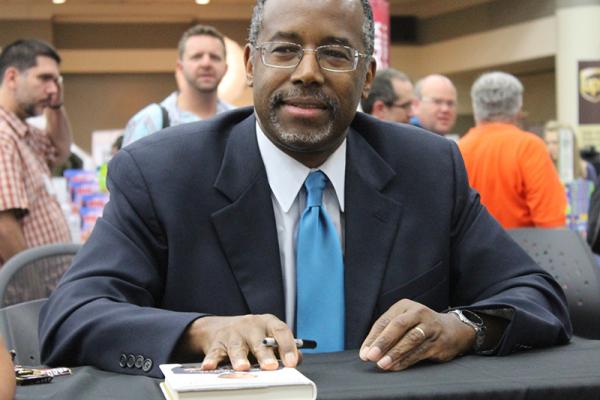Without a commitment to having hard conversations, and without healthy outlets for them, disagreements can be terrifying. They can seem like the end of the world, especially in the rarified atmosphere of our churches.
Unfortunately, Christians often deal with disagreements in their congregations in one of a handful of ways. We might disagree only in public, or only in denominational forums; we might talk only to our pastor, or only to the people who agree with us; we might let our money do the talking for us; we might not say anything at all; or we might split — leave, get kicked out, break fellowship.
But it doesn’t have to be this way. We can create a culture of rich dialogue, even around our disagreements. We can cultivate community conversations marked by gracious space and spacious grace. This unity is possible because we are bound by a covenant
Kim Davis, the embattled Kentucky county clerk at the center of a dispute over gay marriage and religious liberty, is out of jail but “needs time to rest” and won’t return to work until Sept. 11 or Sept. 14, her lawyers said Sept. 9.
Liberty Counsel, the legal group representing Davis, said she plans to spend time with family after the six-day ordeal in the Carter County Detention Center.
The Rowan County clerk was jailed on Thursday for refusing to comply with a federal judge’s order to issue marriage licenses to same-sex couples. While she was being held, her deputies complied with the order, which satisfied the court.
This simultaneously funny and touching interaction opened a space for Colbert to ask Jeb Bush, somewhat abruptly, “In what ways do you politically differ from your brother George?”
Bush tried to joke, but this time, Colbert was serious. He insisted on a real response.
And because he was not asking Jeb to criticize his brother, only to point out a political difference, the governor must have felt obliged.
“He didn’t veto things,” Bush said.
“He didn’t bring order, fiscal restraint.”
With a combination of satire and earnestness, Colbert finagled an honest, illuminating answer from Jeb Bush about George’s legacy, something most media figures would have had a much harder time doing.
Israel’s 47 Christian schools are entering the second week of an open-ended strike to protest ongoing cuts in government allocations, which they attribute to government discrimination against minority religious groups.
The schools, 40 of them Catholic, teach 33,000 Christian and Muslim Arab students in central and northern Israel.
Officials from various Christian denominations called the strike on Aug. 31, after nearly two years of negotiations with the Ministry of Education failed to convince the government to reinstate the funding it has withdrawn from the country’s semi-private schools during the past six years.
If our nation is to remember the lives of all who have suffered because of 9/11, Christians will need to do their part to renegotiate the terms for who and what we remember. Otherwise, “never forget” will remain a well-intended but shallow slogan that encourages us to elevate some lives above others, and to turn a blind eye to the violence, injustice, and hatred directed at Muslims in our name.
If our nation is to remember the lives of all who have suffered because of 9/11, Christians will need to do their part to renegotiate the terms for who and what we remember. Otherwise, “never forget” will remain a well-intended but shallow slogan that encourages us to elevate some lives above others, and to turn a blind eye to the violence, injustice, and hatred directed at Muslims in our name.
The streamlined marriage annulment procedures unveiled by the Vatican are aimed at simplifying what is often a tedious gauntlet of red tape. But it’s not clear how much effect the reforms ordered by Pope Francis will have in the U.S., where about half of all annulments are granted even though American Catholics are just 6 percent of the global church.
That’s largely because in recent decades American dioceses have taken a number of steps to make the process less cumbersome and time-consuming, some of which were reflected in the new procedures announced Sept. 8 in Rome.
The new rules, the most sweeping reform in centuries, eliminate an automatic review of any “decree of nullity” by a second panel of church judges, and they provide for what is being called a fast-track option that allows for an annulment to be granted by the local bishop within 45 days if both spouses request an annulment or don’t oppose it.
It’s an issue that potentially affects millions of people: in the U.S., 25 percent of Catholics have been divorced; 26 percent of them say they sought annulment, according to Pew Research.
Last fall, in the middle of my first attempt at the academic job market, I got invited to a wedding in far west Texas. By “far west Texas” I mean Marathon, in the part of the state known as Big Bend, about a seven-hour drive from my house. It’s a beautiful drive, moving from the Hill Country of central Texas into grasslands that, somewhere between Sonora and Ozona, give way into the desert that leads up into the low mountains of Big Bend. Or at least I find the drive beautiful — another wedding guest complained at the rehearsal dinner that there was nothing to look at on the drive.
I had some time to go for a run on Saturday morning, so I laced up my shoes and headed down Avenue D, across 1st street and a pair of train tracks. A quarter-mile later (no suburbs or outskirts in Marathon), I was in the desert.
Joan Didion says we’re “well advised to keep on nodding terms with the people we used to be” because “otherwise they turn up unannounced and surprise us, come hammering on the mind’s door at 4 a.m. of a bad night and demand to know who deserted them, who betrayed them, who is going to make amends.”
Well, 17-year-old me isn’t as mad as Didion’s younger self sounds, but he was out there in the desert nonetheless, asking, "Why haven’t you been back here?"
The city of Baltimore has agreed to a settlement with Freddie Gray's family, reports The New York Times.
Ben Carson, the retired neurosurgeon once best known for separating conjoined baby twins, announced May 4 that he will pursue the Republican nomination for U.S. president. Carson is now known as a culture warrior whose criticisms of President Obama have made him a favorite of conservatives. Here are five faith facts about him:
1. He’s a twice-baptized Seventh-day Adventist.
In his book Gifted Hands, Carson, 63, describes being baptized as a boy by the pastor of Detroit’s Burns Seventh-day Adventist Church. At age 12, he told the pastor of another Adventist church in the Detroit suburb of Inkster, that he hadn’t completely grasped his first baptism and wanted to be baptized again.
Carson has served as an Adventist local elder and Sabbath school teacher. But he attends other churches. “I spend just as much time in non-Seventh-day Adventist churches because I’m not convinced that the denomination is the most important thing,” he told RNS in 1999.
“I think it’s the relationship with God that’s most important.”
Try to imagine your morning routine without water. Brushing your teeth, taking a shower, using the bathroom, making tea or coffee. Practically every step requires a lot of water — clean and easily accessible.
For millions of women around the world, the morning routine is very different.
In developing countries around the world, women spend up to five hours every day collecting water from distant and often polluted sources, returning to their villages carrying 40-pound jerry cans on their backs. Water.org reports that women and children in 45 developing countries bear the primary responsibility for water collection. Bodies break down under the weight and often the water makes families sick. Some 50 diseases are related to poor water quality and lack of sanitation. And it’s the children under five who suffer the most.
Dignity and safety are hard to come by in a world without water and sanitation. Women and girls must sneak off into a secluded field in the dark of night for privacy, where some will be molested or raped. When a girl reaches puberty, she is either humiliated at school or misses several days each month — many drop out altogether just to manage menstruation. It’s an unfair reality that keeps millions of young women in poverty, with no way out.









